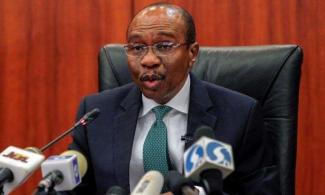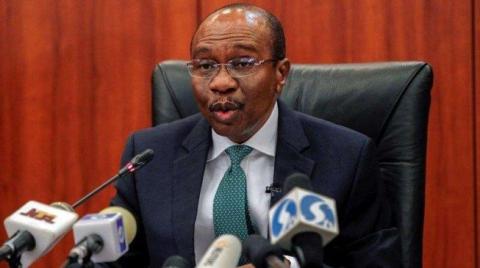
“We have started, our Economic Intelligence Department has started investigating the accounts of some of you or those of you who are involved in smuggling or dumping palm oil into Nigeria.

Godwin Emefiele, Governor of the Central Bank of Nigeria, said in a meeting with executives of indigenous oil palm producers in Abuja Friday that the bank has begun the investigation of the accounts of companies importing the cash commodity into the country.
At the meeting which was attended by the Edo State Governor, Godwin Obaseki, Emefiele said N30 billion has so far been disbursed to palm oil producers.
“We have started, our Economic Intelligence Department has started investigating the accounts of some of you or those of you who are involved in smuggling or dumping palm oil into Nigeria.
“We feel that before any action are taken against you in terms of blocking you from the foreign exchange market or blacklisting you from doing banking in Nigeria that we first invite you to say that we are drawing a line that importation of palm oil in Nigeria must stop.
“But stopping also means that we must as Central Bank and Deposit Money Banks create an opportunity for you to access credit to grow your plantations,” the returning CBN governor said. He further revealed that the bank has received a Presidential Order to blacklist any firm or individual that imports any of the 43 items on the foreign exchange banned list into the country.
“Part of that presidential directive so says that we should blacklist from the foreign exchange market and the banking industry all firms, their owners and their top management caught smuggling or dumping any of the restricted 43 items into Nigeria,” he told the gathering. The governor also informed them that the Presidential directive mandates the bank to expand access to credit for nine other crops besides palm oil.
“The presidential directive that we have received is not about palm oil alone. We have received a presidential directive to focus on the production of ten different commodities.
“And this is the programme we will be embarking upon in the next couple of years. The ten different products are rice, maize, cassava, tomatoes, cotton, oil palm, poultry, fish, livestock dairy and cocoa.
“The presidential directive that we received said that we must expand, seek to give support to people who want to expand the production of these products in Nigeria.” Nigeria has not yet attained sufficient production in lots of the items banned from accessing forex.
An outright ban of these products from accessing forex and blacklisting the companies doing so could lead to scarcity in the availability of these products pending the success of the government’s expansion programme. In March 2019, Emefiele said Nigeria’s spent $500 million annually importing palm oil. This implies that there could be a rush to the black market for forex as happened in 2016 before the set-up of the investment and Export window.